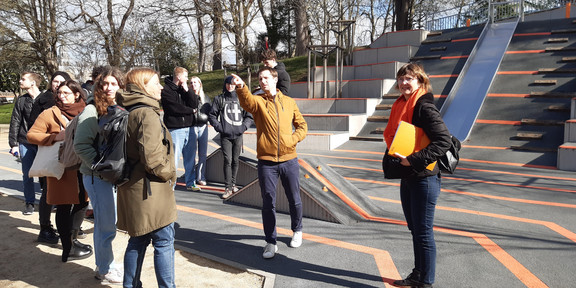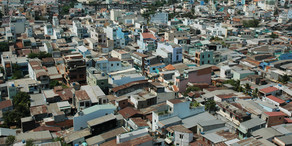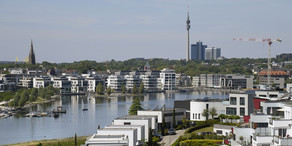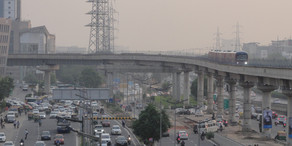News and events from the research group
F14 Project "Hello from the other side" took an excursion to Normandy
- Archiv
- Forschung
- Studierende
- Fachgebiet

Excursion to Normandy: F-Project gained insights into barrier-free urban design for invisibly disabled people
Accessible urban design is usually associated with ramps for wheelchair users or guide strips for blind people - but the fact that over 90% of disabilities are invisible is hardly known. In professional discourse, the spatial needs of invisibly disabled people remain largely unmentioned, and only a few examples of implementation can be found in planning practice. The F-Project 14 "Hello from the other side - The (non-)consideration of people with invisible disabilities in spatial planning" aims to contribute to closing the research and implementation gap and to sensitise planners to the needs of this group of people with regard to planning processes and measures. As examples, the group studies people with dementia, deafness and autism spectrum disorders.
In March, the twelve-member project went on an excursion to Évreux, France, to gain insights into a city that specifically addresses the topic. They were accompanied by supervisor Katrin Gliemann (IPS) and advisor Anja Szypulski (SOZ). The European Commission has already awarded the city in Normandy twice with the "Access City Award" for its commitment to people with invisible disabilities. The project conducted interviews on site, including with the deputy mayor Francine Maragliano, who is a major driving force behind the issue. In addition, the director of the Health House, Julien Boscher, guided the group through the city centre and drew attention to various examples of implementation but also to problems that have yet to be solved. Participation in a meeting of the "Grenelle du Handicap" - a forum of experts, affected persons and multipliers - showed how much the success of such strategies depends on the involvement of the target groups. Since there are only a few documented experiences on this topic, Évreux is mainly oriented towards the concrete everyday experiences of the residents with "handicaps invisibles". This has led to projects such as a playground for autistic children, a cinema adapted to the needs of invisibly disabled people, or special guidance systems at public transport stops and in timetables. The F-Project will use the experiences from Évreux as well as the interviews and research conducted in Germany to carry out a deficit analysis and develop concrete proposals for a better consideration of the needs of invisibly disabled people.







